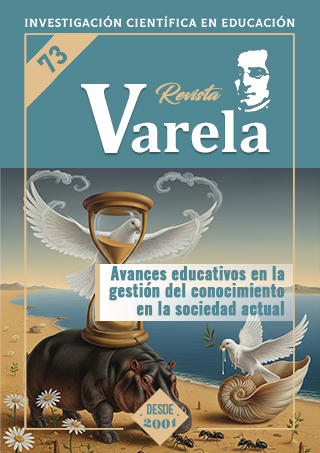Call number 74 (May-Aug 2026)
Good educational practices in the development of skills in the digital age
Closing: February 28, 2026
Home
Varela Journal is an internationally recognized, peer-reviewed electronic publication published in Spanish and English. It disseminates contributions in multiple areas of educational theory, practice, and research. It is aimed at teaching staff at educational institutions, scientists and academics in the field of education, students in initial teacher training, social stakeholders, and the general public specializing in general educational topics.
The name of the journal pays tribute to Félix Varela Morales (1788-1853), one of the outstanding figures of Cuban educational and pedagogical thought, whose ideas transcend time and remain fully relevant today. This publication was launched in 2001 and is managed by the Pedagogical Documentation and Information Center of the Félix Varela Morales University of Pedagogical Sciences in Villa Clara, Cuba. In September 2015, as a result of the integration process of higher education institutions in Cuba, the journal was transferred to the Faculty of Early Childhood Education of the Central University “Marta Abreu” of Las Villas (UCLV), which did not entail any changes to its editorial policies or management.
Varela Journal is published quarterly, covering the January-April, May-August, and September-December issues, with a continuous publication of articles during each phase. The journal accepts unpublished contributions that reflect theoretical essays or experiences and innovations, as well as research reports, which are structured into a Monograph section and another section dedicated to Educational Research. All contributions received must meet the requirements of originality, adhere to standards, and use impersonal and inclusive language. They are subject to a rigorous peer-review system. As part of the journal's continuous improvement, anti-plagiarism computational tools are being used, and open review and preprint publication are planned to begin soon, as well as access to research data.
The journal is affiliated with the Open Access movement (Diamond), making it completely free and open access. It does not charge authors an Article Processing Charge (APC) or readers to access the published content, which is protected by the Creative Commons 4.0 license. Furthermore, the publication complies with ISO standards regarding the essential elements related to the formal presentation of the journal, guidelines for authors, standardization of authors and contributors, and standardization of article submission. Varela Journal is governed by the ethics of scientific publication as expressed by the Committee of Publication Ethics, COPE (https://publicationethics.org/core-practices).
This publication is certified by the Cuban Ministry of Science, Technology and Environment (CITMA) and indexed in several directories, indexes, and databases, such as REDALYC, DOAJ, CLASE, LATINDEX, REDIB, ERICHPLUS, among others.

The Varela Journal (https://revistavarela.uclv.edu.cu), a pedagogical publication managed by the Faculty of Early Childhood Education of the Central University “Marta Abreu” of Las Villas, is pleased to present to its readers and contributors, published continuously, issue number 73, corresponding to the January-April 2026 period. This issue's monographic section will address the topic:
EDUCATIONAL ADVANCES IN KNOWLEDGE MANAGEMENT IN TODAY'S SOCIETY
The scientific and technological development that characterizes today's society requires the continuous improvement of knowledge management, considered a fundamental strategic resource for individuals of any country, latitude, culture, or level of development. Therefore, it is essential that the educational field promote the creation of learning environments based on current methods of working with technologies and information at all types and levels of education.
Educational institutions must respond to the new expectations of lifelong learning. Knowledge management is therefore the cornerstone for individuals to become effective learners and contribute to social development, which is heavily dependent on advances in the generation of new scientific knowledge. This underscores the importance of promoting an education that provides learners with the theoretical, methodological, and technical tools to develop the knowledge management skills required in today's world.
This issue, in its MONOGRAPH section, offers contributions that address research, innovations, and experiences in educational practice related to this theme, adapted to the demands of contemporary society. Additionally, in its EDUCATIONAL RESEARCH section, this issue presents articles unrelated to the monograph's theme, expressing the results of scientific work from different perspectives within the field of education. This issue will be completed as the review, editing and layout process of the submitted articles is finalized and will close at the end of April 2026.
Good educational practices in the development of skills in the digital age
Closing: February 28, 2026
Innovative experiences to promote quality education for all
Closing: June 30, 2026
APA Style 7ht edition in english
APA Style 7th edition in spanish
UCLV DSpace (Repository of scientific documents of UCLV)

Varela Journal by Central University "Marta Abreu" of Las Villas is licensed under a Creative Commons Reconocimiento-NoComercial 4.0 Internacional License.
Created from the work on revistavarela.uclv.edu.cu.